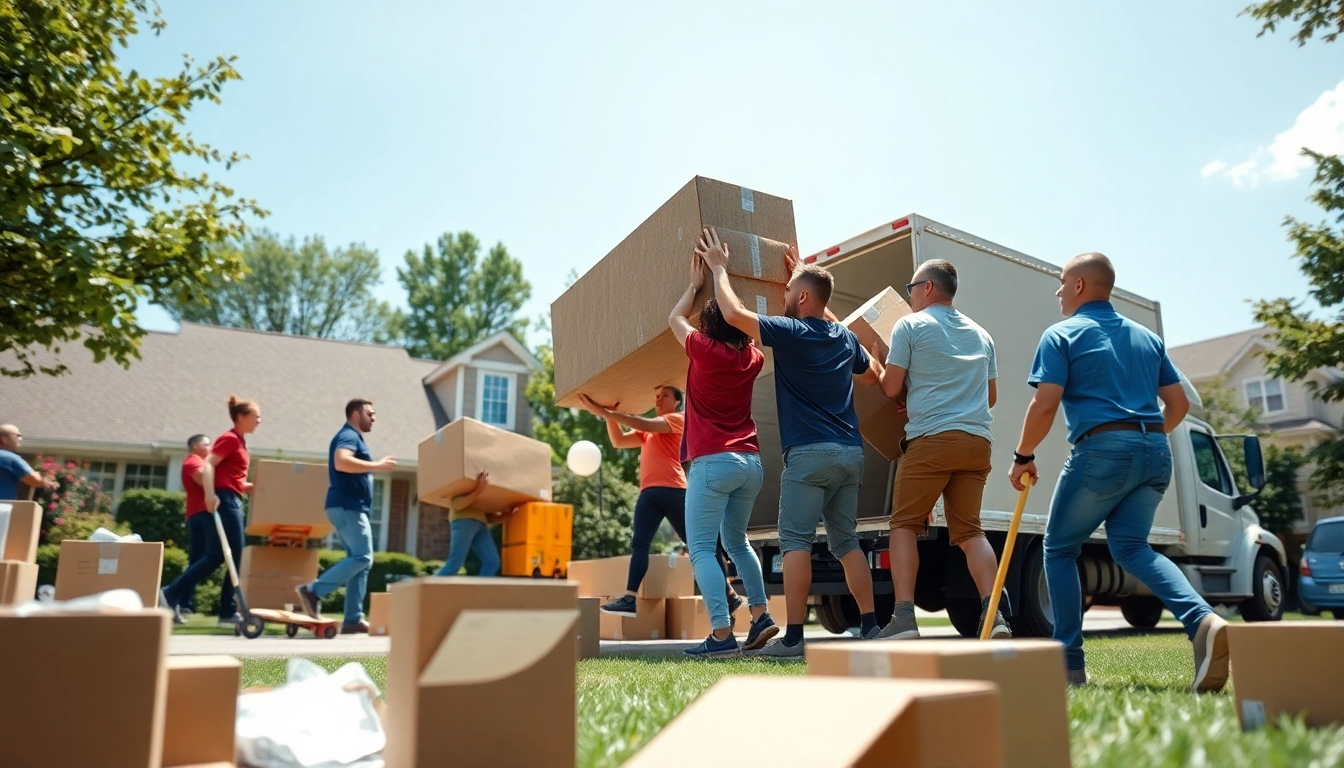Understanding House Moves
Moving house is a significant event in anyone’s life, often considered one of the most stressful experiences alongside divorce or job loss. Whether you’re relocating to a new neighborhood, moving to a city for a job, or simply upgrading to a larger space, understanding the nuances of house moves is crucial for a smooth transition. This comprehensive guide aims to provide valuable insights, from defining what constitutes a house move to offering actionable tips for successful execution.
What Constitutes a House Move?
A house move involves relocating from one residence to another, which includes a variety of logistical tasks such as packing, transporting belongings, and unpacking in the new location. Typically, this process is broken down into three main stages: planning, executing, and settling in. Each stage has its own set of challenges that require careful consideration and strategic planning. A house move can be local (within the same city or town), long-distance (across states or regions), or international, each with its unique requirements and complications.
Common Challenges in House Moves
Several challenges may arise during a house move, including:
- Logistical Issues: Coordinating transportation, timing, and manpower can be difficult.
- Packing Overwhelm: Deciding what to keep, sell, or discard can lead to indecision and stress.
- Emotional Strain: Leaving a familiar home often causes anxiety and sadness.
- Budget Constraints: Expenses can quickly escalate beyond the initial budget for services like movers or supplies.
- Time Management: Fitting a move into a busy schedule often feels overwhelming.
The Importance of Planning Ahead
Planning ahead is critical in mitigating many of these challenges. A person can alleviate distress by creating a strategic timeline for the move, setting a budget, and organizing tasks into manageable steps. Advanced preparation fosters a sense of control, essential for reducing the emotional burden associated with transitioning to a new home.
Preparing for a House Move
Creating a Detailed Moving Checklist
A moving checklist is an invaluable tool that helps keep track of tasks. An effective checklist should start at least six weeks before the moving day and include the following:
- Research and select a moving company.
- Create an inventory of belongings.
- Gather packing supplies (boxes, tape, labels).
- Notify necessary parties of the address change (utilities, subscriptions, banks).
- Sort items to decide what goes to the new home.
Updating the checklist regularly will make the entire process more systematic and less overwhelming.
Choosing the Right Moving Company
Selecting a reliable moving company can make all the difference to your experience. Here are key factors to consider when making your choice:
- Reputation: Check online reviews, ratings, and testimonials.
- Licensing and Insurance: Confirm that the company operates legally and offers all necessary protection for your belongings.
- Services Offered: Examine whether they provide additional services such as packing, unpacking, and storage.
- Estimates: Obtain multiple quotes and ask detailed questions about pricing structures.
Taking the time to choose the right moving company can help avoid unexpected complications later on.
Packing Strategies for a Successful Move
Packing effectively is essential to ensure belongings arrive safely at the new house. Here are some strategies to consider:
- Room by Room: Tackle one room at a time, labeling boxes clearly to indicate contents and destination.
- Essential Items: Pack a “first-night” box containing essentials such as toiletries, basic kitchen items, and important documents.
- Use Quality Supplies: Invest in sturdy moving boxes and packing materials to protect valuables.
- Declutter: Use the move as an opportunity to donate or sell items you no longer need, reducing what you need to pack and move.
Following strategic packing techniques not only enhances organization but also protects your possessions during transit.
Executing the Move: Steps to Follow
Day of the Move: What to Expect
On moving day, it is essential to remain organized and adaptable. Expect potential delays or changes in plans. Actions you should take include:
- Final Walkthrough: Conduct a last inspection to ensure nothing is left behind.
- Communicate with Movers: Provide clear instructions and ensure they have the appropriate parking permits if needed.
- Coordinate with Helpers: If friends or family are assisting, assign roles to streamline the process.
Being prepared for the unexpected will help keep the mood constructive throughout the day.
Managing the Logistics of House Moves
Logistics can make or break a house move. Here are several tips for efficient logistics management:
- Timing: Aim to move during off-peak hours if possible to avoid excessive traffic and delays.
- Transport: Ensure your moving truck is suitable for the items you are transporting, emitting no less than the necessary loading capacity.
- Safety Measures: Encourage helpers to lift correct items and follow safety protocols to prevent injuries.
Effective management will help everything run smoothly and efficiently.
Useful Tools and Equipment for Efficiency
Utilizing the right tools can significantly enhance the moving process. Consider using:
- Dollies: For heavy furniture and appliances, dolly can ease lifting and transporting large items.
- Furniture Blankets: Protect valuables from damage during transit.
- Packing Peanuts and Bubble Wrap: Cushion fragile items and prevent breakage.
Investing in moving tools can streamline the process and reduce wear and tear on your possessions.
Post-Move Considerations
Unpacking and Organizing Your New Home
After the move, unpacking is often a daunting task. To make it manageable,:
- Start with Essentials: Unpack essential items first, such as bedding, toiletries, and tools.
- Organize by Room: Like the packing process, unpacking can be more efficient when done room by room.
- Take Your Time: Avoid the temptation to rush; organization leads to a more pleasing environment.
Proper unpacking will speed up the transition into your new home.
Updating Your Address and Other Essentials
Don’t forget to update your address with various entities. This includes:
- Utility companies (water, gas, electricity)
- Banking institutions
- Insurance providers
- Subscription services (magazines, Amazon, etc.)
Regularly reviewing address changes can prevent potential interruptions in services.
Emotional Aftermath and Settling In
Relocating brings about an emotional transition. It’s essential to allow time for adjustment. Some tips for settling in include:
- Explore Your Neighborhood: Familiarize yourself with local amenities and services.
- Connect with Neighbors: Building relationships with new neighbors can ease the emotional transition.
- Create a Sense of Home: Display personal items and photos to enhance familiarity in your new space.
Taking time to acclimate emotionally can lead to a positive experience in your new surroundings.
Best Practices for Future House Moves
Lessons Learned from Previous House Moves
Reflecting on past moving experiences can provide valuable insights for future transitions. Consider keeping a moving diary to document what went well and what didn’t. Questions to consider include:
- What strategies worked for organizing?
- What challenges were encountered and how were they addressed?
- Were there any unexpected surprises that could be avoided in future moves?
Learning from past moves can enhance future relocation experiences.
Building Relationships with Movers for Future Needs
Establishing a rapport with moving companies can bring benefits for future relocations:
- Better Rates: Returning customers often negotiate lower rates.
- Reliable Service: Familiarity can lead to more trustworthy service experiences.
- Personalized Assistance: Established relationships can lead to better understanding of specific needs.
Creating a network of trusted movers can significantly ease the stress of any future house moves.
Cost-Saving Tips for House Moves
Moving doesn’t always have to be costly. Consider these ways to save money during your house move:
- DIY Packing: Pack your belongings yourself instead of hiring movers.
- Off-Peak Timing: Schedule your move during off-peak seasons when rates are lower.
- Ask for Help: Utilize friends and family to help with packing and lifting instead of hiring labor.
- Utilize Recycled Materials: Use boxes and packing materials from local retail stores instead of purchasing new supplies.
Implementing cost-saving measures allows for a smoother transition without overly straining the budget.



